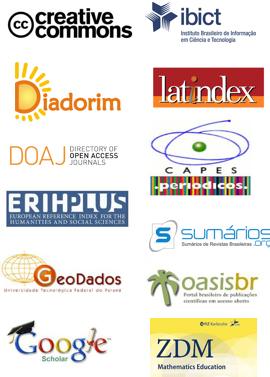THE EFFECTS OF AN ADVANCED HIGH SCHOOL COURSE IN NUMBER THEORY AND ALGEBRA ON STUDENTS’ MATHEMATICAL SELF-EFFICACY
DOI:
https://doi.org/10.17921/2176-5634.2013v6n1p%25pResumo
The purpose of this mixed methods study was to determine the effects of participation in an advanced course in proofs and problems in number theory and algebra on high achieving high school students’ mathematical self-efficacy. In addition to learning how to prove theorems, students were expected to engage in higher order mathematical thinking for the purpose of developing mathematical habits of mind. Because the course focused on abstract thinking, and thus was significantly different from the other math courses students had taken, the study focused on determining whether self-efficacy changed as a result of course participation, particularly because of the ways self-efficacy affects goal setting and perseverance in the face of challenging tasks. To that end, self-efficacy was measured at the beginning and end of the course using a self-efficacy instrument aligned with course goals. In addition, students participated in group interviews at the end of the course and provided written feedback about ways course participation affected their self-efficacy as well as their interest in pursuing additional advanced math courses in college. Results indicated a large effect size difference between students’ pre- and post-course course self-efficacy as well as their self-efficacy at the beginning of the course and their perceived ability to complete course goals (potential). Further, although all participating students earned an A in the course and demonstrated their attainment of the course objectives, qualitative data revealed that students characterized themselves as either in the group who “got” PPNTA or who “didn’t get” the course [Note: “get it” is an American idiom that means to deeply understand something]. Those who placed themselves in the group who “got it” had higher self-efficacy, were more interested in the abstract, theoretical aspects of the course, and demonstrated greater interested in taking advanced math courses in college. Students in the group that “didn’t get” the course described fluctuations in their self-efficacy that were dependent on the difficulty of the topics being covered. In addition, these students were more interested in taking courses that focused on concrete knowledge and practical application, and they were less interested in pursuing advanced math courses in college.Downloads
Publicado
2015-06-18
Como Citar
Hendricks, C. C., & Millman, R. S. (2015). THE EFFECTS OF AN ADVANCED HIGH SCHOOL COURSE IN NUMBER THEORY AND ALGEBRA ON STUDENTS’ MATHEMATICAL SELF-EFFICACY. Jornal Internacional De Estudos Em Educação Matemática, 6(1). https://doi.org/10.17921/2176-5634.2013v6n1p%p
Edição
Seção
Artigos


